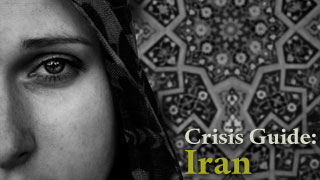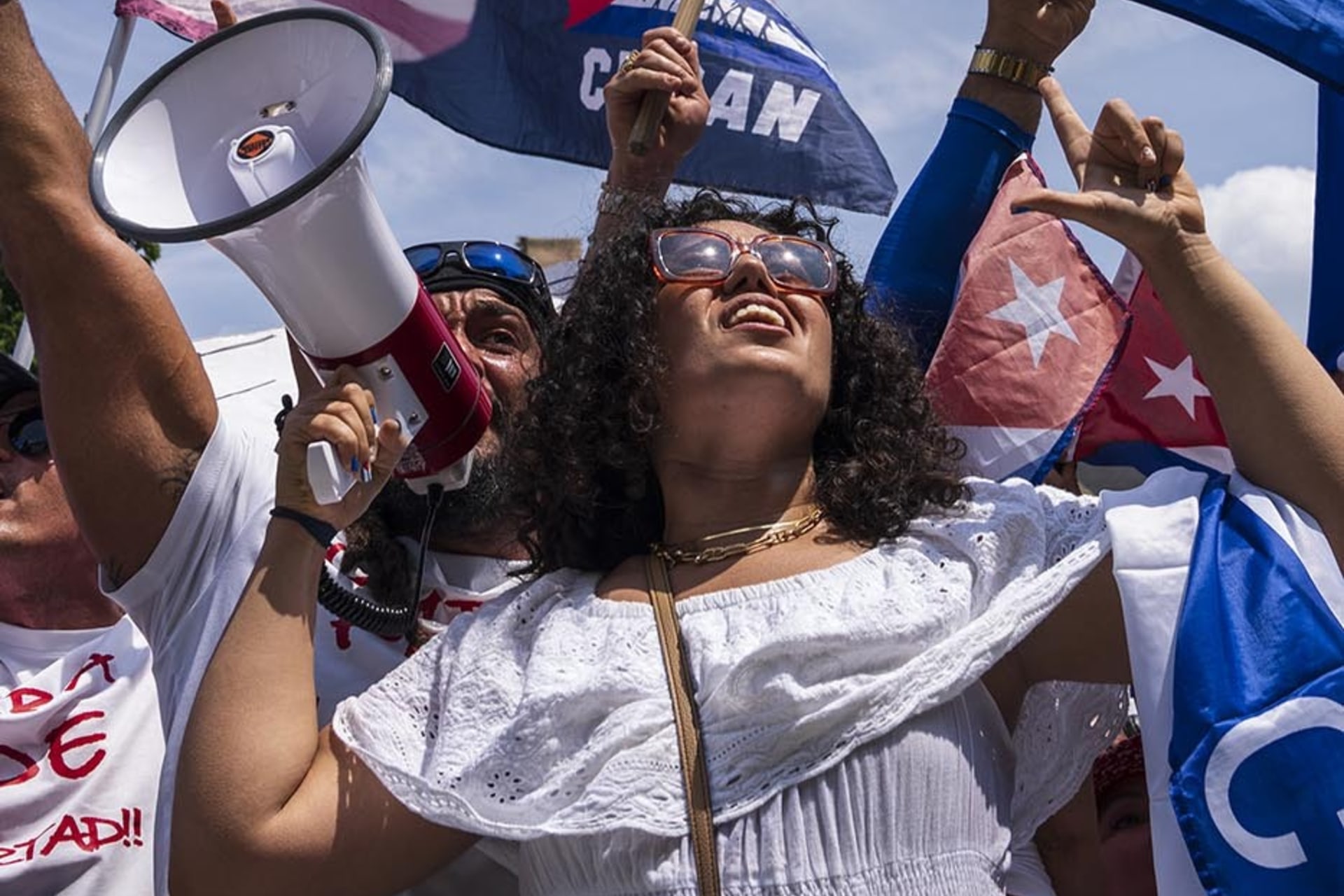The Candidates on U.S.-Iran Policy
Published
Updated
Deterring Iran’s nuclear weapons program is a foreign policy priority for the United States. Candidates for the 2012 presidential elections debate the best options, including a military strike.
Thwarting Iran’s nuclear ambitions has been a top priority for several recent U.S. administrations, but the issue has taken on special urgency in the last stretch of the 2012 presidential campaign as the drumbeat of war against Iran grows louder. With the Netanyahu administration’s recent ratcheting up of rhetoric against a “nuclear” Iran, speculation that a unilateral Israeli attack on Iran could be this election year’s “October surprise” continues to intensify.
To date, the international community’s response to Iran’s nuclear ambitions has primarily taken the form of economic sanctions. The EU, in particular, has enacted a number of tough measures, including an embargo of oil exports (that went into effect on July 1), which many analysts believe will place an untenable strain on the Iranian economy, given the EU’s position as Iran’s largest trading partner.
Similarly, President Obama has relied heavily on sanctions in his first term to pressure the Iranian regime, and his administration continues to tighten the economic screws in tandem with Congress, which recently approved new restrictions on the country’s oil and shipping sectors. While Mitt Romney has also called for increased economic and diplomatic pressure, the Republican challenger has recently distinguished his position vis-à-vis Iran by drawing the line at the development of a nuclear “capability” (Atlantic), rather than a “weapon.” For some analysts, this shift in terminology could be used to lower the bar for future military action, and therefore reveals an important policy schism between the two candidates.
Editor’s Note: Click here for more CFR Issue Trackers and other 2012 campaign resources, which examine the foreign policy and national security dimensions of the presidential race.
This publication is now archived.
Barack Obama
Democratic Incumbent, Running Mate Joe Biden
Upon entering the White House, President Obama invited the leaders of the Islamic republic to reset U.S.-Iran relations. In a video message addressing Iranians during the Persian holiday of Nowruz, he stated that his administration sought “engagement that is honest and grounded in mutual respect.”
These efforts, however, were upended by the disputed Iranian presidential election and ensuing protests of June 2009. While Obama initially opted for a muted response, the Iranian regime’s violent crackdown of opposition supporters complicated his administration’s attempt to balance outreach with its defense of human rights.
In October 2009, the Obama administration brokered a fuel-swap deal in conjunction with the International Atomic Energy Agency (IAEA), which required the international community to provide fuel for Tehran’s research reactor while implementing safeguards. Iran initially agreed to these terms, but it later withdrew support.
By 2010, Tehran’s continued repression of opposition supporters and newly surfaced reports outlining Iran’s enrichment-related activities (including information that it was building a secret uranium-enrichment facility near Qom) resulted in Obama’s hardening stance toward the country. The administration has since worked to isolate Iran diplomatically and economically by imposing new sanctions and toughening existing ones against the regime, both unilaterally and through the United Nations. Some analysts believe the administration participated in covert actions to sabotage Iran’s nuclear program, most notably with the 2010 Stuxnet cyberattack (NYT), but there has been no official confirmation of U.S. involvement.
In November 2011, following a report by the IAEA that included “credible evidence” (BBC) of an Iranian nuclear weapons program, the administration redoubled its efforts to squeeze the regime. For the first time, U.S. sanctions targeted Iran’s petrochemical and banking sectors. In February of 2012, Obama signed an executive order authorizing U.S. institutions to freeze all property and interests (al Jazeera) of the Iranian government, central bank, and financial institutions that come within U.S. jurisdiction.
With regards to a military strike against Iran, the Obama administration insists that one remains on the table, but it continues to underscore the merits of working toward a diplomatic resolution. In remarks delivered at the American Israel Public Affairs Committee (AIPAC) policy conference in Washington, D.C. on March 4, President Obama told the crowd that “diplomacy backed by pressure” could succeed. He added that, “Iran’s leaders should understand that I do not have a policy of containment; I have a policy to prevent Iran from obtaining a nuclear weapon.”
In late March 2012, Obama said there was a “sufficient supply of non-Iranian oil” (BBC) to proceed with sanctions aimed at slashing Tehran’s oil revenue while avoiding a disruptive spike in oil prices. While the Obama administration continues to press for more sanctions (WashPost), it has remained largely silent (Haaretz) in the face of the increasingly bellicose rhetoric coming out of Tel Aviv’s defense ministry.
In a 60 Minutes interview in September, Obama denied feeling any pressure from Israeli Prime Minister Benjamin Netanyahu to draw “red lines” on Iran after which the United States would respond militarily. “When it comes to our national security decisions, any pressure that I feel is simply to do what’s right for the American people,” he said.
In his annual address to the UN General Assembly in September, Obama repeated that the United States wants to resolve Iran’s nuclear issue through diplomacy, but that the time for doing so is not unlimited. He also noted that the goal remains to prevent Iran from obtaining nuclear weapons, not containment after the fact.
In the third and final presidential debate held on October 22, the president denied a report published in the New York Times that the United States would engage in bilateral talks with Iran about its nuclear program after the election.
Obama then proceeded to emphasize the importance of exhausting diplomatic and economic sanctions before considering a military strike: “The disagreement I have with Governor Romney is that, during the course of this campaign, he’s often talked as if we should take premature military action. I think that would be a mistake, because when I’ve sent young men and women into harm’s way, I always understand that it’s the last resort, not the first resort.”
He also touted the success of the economic sanctions levied against Iran, noting that its currency has been devalued by 80 percent and oil exports are at their lowest level in twenty years.
Mitt Romney
Republican Candidate, Running Mate Paul Ryan
Mitt Romney has called for broad U.S. support of Iranian dissidents working to bring about regime change in their country. During the November 2011 primary debate in Spartanburg, South Carolina, the Republican challenger faulted Obama for not speaking out sooner during the pro-democracy protests of 2009 and telling protesters, “America is with you.”
During that debate, Romney stated that it was “unacceptable for Iran to have a nuclear weapon,” and referenced the range of economic, diplomatic, and military measures he would employ to deter Tehran. “If you’d like me as the next president, they will not have a nuclear weapon,” he said.
In regards to the Strait of Hormuz, Romney said he would consider it an “act of war” if Iran closed the critical sea passage during the January 2012 primary debate in Tampa, Florida. He also expressed concern about the size of the U.S. Navy. “It is appropriate and essential for our military, for our navy to maintain open seas,” he said.
Like President Obama, Romney also voiced his support for tough economic sanctions against Iran at the AIPAC policy conference in March 2012, but stressed that he would be ready to take matters further if necessary. He told the assembled crowd, “I will make sure Iran knows of the very real peril that awaits if it becomes nuclear.”

In an op-ed entitled “How I Would Check Iran’s Nuclear Ambition” (WashPost), Romney wrote that he would “restore the regular presence of aircraft carrier groups in the Eastern Mediterranean and the Persian Gulf region [and increase] military assistance to Israel and [improve] coordination with all of our allies in the area.”
During his trip to Jerusalem in July 2012, Romney garnered headlines for his espousal of several pro-Israeli positions, including a zero-tolerance policy toward Iran developing the “capability” to build a nuclear weapon (FT).
“As we face the challenges of an Iran seeking nuclear capability, we must draw upon our interests and our values to take them on a different course,” he stated after meeting with Prime Minister Netanyahu. For some analysts, this statement represents a significant semantic shift from his previously held objection to Iran’s acquisition of a nuclear “weapon,” because such terminology could potentially be used to lower the bar for a preemptive military strike.
In an op-ed in late September, Romney mentioned Iran in discussing the situation in the Middle East, mentioning Iran. “When we say an Iranian nuclear-weapons capability—and the regional instability that comes with it—is unacceptable, the ayatollahs must be made to believe us,” he wrote.
In a major speech on foreign policy in October, Romney spoke of the Iran-Syria relationship. “Iran is sending arms to Assad because they know his downfall would be a strategic defeat for them,” he said. “We should be working no less vigorously with our international partners to support the many Syrians who would deliver that defeat to Iran--rather than sitting on the sidelines.”
In the third presidential debate held in Boca Raton, Florida on October 22, Romney repeated his assertion that “a nuclear-capable Iran is unacceptable to America” but was in broad agreement with the Obama administration’s approach of imposing economic sanctions: “[T]hey do work. You’re seeing it right now in the economy. It’s absolutely the right thing to do, to have crippling sanctions. I would have put them in place earlier. But it’s good that we have them,” he said.
Romney also said that Iran perceives the United States as weak because the president did not adequately support the Green Revolution, and called for Ahmadinejad to be indicted under the Genocide Convention for his comments on Israel, which, he said, are tantamount to “genocide incitation.”t





